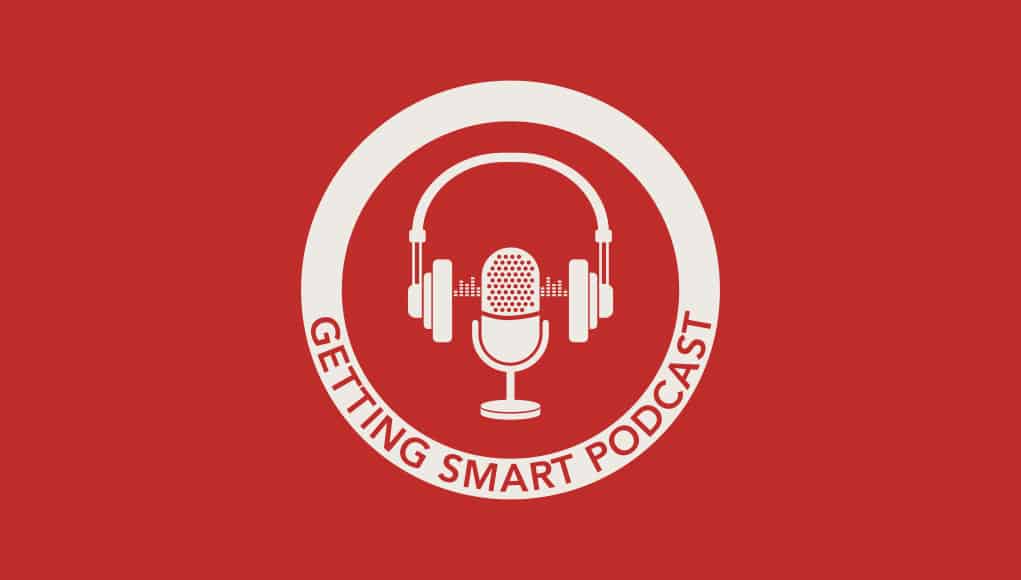Getting Smart Podcast | Improving Learner Experience: Agency, Community, Challenge

New tools and strategies that provide the opportunity to create powerful learning experience (LX) improve every year. Last month a group of regional and national LX experts met with teenagers trained in design thinking at #LXsummit 2017.
Hosted by Boise nonprofit One Stone, the convening was an opportunity to learn together about promoting student agency, measuring what matters, and scaling personalized learning. As discussed last month, One Stone is a student-led and student-centered organization with a track record of creating powerful developmental opportunities after school. The #LXsummit was hosted, in part, to celebrate the first year of operation of the One Stone high school and inform the path forward.
Students like Jared (below) discussed the Bold Learning Objectives (BLOB) at One Stone. At the heart of the matter for One Stone founder Teresa Poppen is student voice–developing the agency that allows students to express who they are with confidence.

Place-Based Education
One of the highlights of the summit was a walking tour of downtown Boise with a focus on place-based education (PBE). The tour was led by Nate McClennen of Teton Science Schools (see a recent post), the national leaders in PBE, and One Stone opportunity wrangler Neva Geisler. We were able to record it for the Getting Smart Podcast, so join us on the tour without leaving your chair:
Podcast Highlights
McClennen recapped the six elements of place-based learning: local to global, learner-centered, inquiry-based, design thinking, community as classroom and interdisciplinary approach. He sees place-based education at One Stone as a true example of student agency, where “students are at the center, involved in projects that not only increase learner outcomes and engagement but truly create positive change in the community.”
Neva noted that given needs for skilled employment, the Idaho’s State Board of Education set a goal for 60 percent attainment rate of a college or post-secondary degree (for 25- to 34-year-olds) by 2020–a 10 point improvement over current levels. A high percentage of Idaho workers earn at or below the federal minimum wage. “The current state of affairs is an economic development issue we have to crack,” said Geisler.
A quick mile loop revealed dozens of project- and service-based learning opportunities including:
- Homeless shelter, senior living center and low-income housing;
- Learning corridor including incubator Trailhead, library and Boise State (see podcast);
- Anne Frank Memorial and The Cabin, a center for writers;
- Meeting space JUMP, Simplot and downtown businesses; and
- The Boise River Greenbelt.
“When you think of the entire community as your classroom, you have unlimited opportunities. Imagine the diversity of learning experiences you can offer students to make learning real world and relevant,” said Neva.
A five-minute exercise revealed examples of projects focused on each of the elements of PBE:
- Conditions that create homelessness;
- Analysis of river flow including what influences it, who manages it and who is impacted;
- Floating the river with students that wouldn’t have access; and
- Studying connections between protests at the capitol and national and international movements.
LXtras
Other LX magic moments included:
- Eight one minute student descriptions of learning at One Stone.
- A discussion on how networks work and why that is important.
- Julia Freeland Fisher, Christensen Institute, discussed her new research into social capital (see a recent post for a great summary).
- Carleen Schnitker, Nampa School District, and Jeff Petty discuss community-based learning in the Big Picture network.
- Tony Lewis, Donnell-Kay Foundation, laid out the vision for ReSchool Colorado.
- Jake Thompson talked about student agency at Acton Academy (see recent podcast).
- Mike McGalliard, Imagination, discussed supporting creativity.
Boost Your LX!
Getting Smart Services helps design and coaches powerful new learning environments like One Stone. We co-construct professional learning experiences like the LXsummit. We help communities discover the path forward. Let’s work together! Contact [email protected] for more.
For more, see:
- Quick Start Guide to Place-Based Education
- 6 Phases of Professional, Place-Based Learning
- The Potential of Place-Based Education (infographic)
Stay in-the-know with all things EdTech and innovations in learning by signing up to receive the weekly Smart Update. This post includes mentions of a Getting Smart partner. For a full list of partners, affiliate organizations and all other disclosures please see our Partner page.












0 Comments
Leave a Comment
Your email address will not be published. All fields are required.